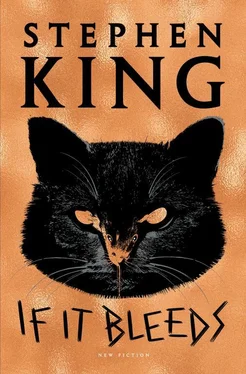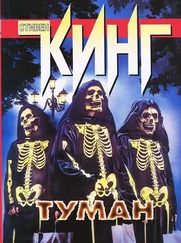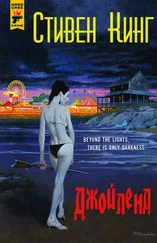“Unc?”
Doug turns to see Brian in the doorway, still wearing his letter jacket and backpack.
“You left school early?” Doug asks.
“With permission. Mom texted me that she was going to let them turn off the machines. Did they?”
“Yes.”
“When?”
“An hour ago.”
“Where’s Mom now?”
“In the chapel on the first floor. She’s praying for his soul.”
And probably praying that she did the right thing, Doug thinks. Because even when the priest tells you yes, it’s fine, let God take care of the rest, it feels wrong somehow.
“I’m supposed to text her if it looks like he’s…” Brian’s uncle shrugs.
Brian approaches the bed and looks down at his father’s still white face. With his black-framed glasses put aside, the boy thinks his dad doesn’t look old enough to have a son who’s a freshman in high school. He looks like a high school kid himself. He picks up his father’s hand and plants a brief kiss on the crescent-shaped scar there.
“Guys as young as him aren’t supposed to die,” Brian says. He speaks softly, as if his father can hear. “Jesus, Uncle Doug, he just turned thirty-nine last winter!”
“Come sit down,” Doug says, and pats the empty chair next to him.
“That’s Mom’s seat.”
“When she comes back, you can give it to her.”
Brian shucks his backpack and sits down. “How long do you think it will be?”
“The doctors said he could go anytime. Before tomorrow, almost certainly. You know the machines were helping him breathe, right? And there were IVs to feed him. He’s not… Brian, he’s not in any pain. That part is over.”
“Glioblastoma,” Brian says bitterly. When he turns to his uncle, he’s crying. “Why would God take my dad, Uncle Doug? Explain it to me.”
“I can’t. God’s ways are a mystery.”
“Well fuck the mystery,” the boy says. “Mysteries should stay in storybooks, where they belong.”
Uncle Doug nods and puts an arm around Brian’s shoulders. “I know it’s hard, kiddo, it’s hard for me, too, but it’s all I got. Life’s a mystery. So is death.”
They fall silent, listening to the steady bip… bip… bip and the rasp as Charles Krantz—Chuck, to his wife and his wife’s brother and his friends—takes one slow breath after another, his body’s last interactions with the world, each inhale and exhale managed (like the beat of his heart) by a failing brain where a few operations still continue. The man who spent his working life in the accounting department of the Midwest Trust is now doing his final tallies: small income, large disbursements.
“Banks are supposed to be heartless, but they really loved him there,” Brian says. “They sent a ton of flowers. The nurses put them in that solarium thing because he’s not supposed to have flowers. What did they think? That it was going to kick off an allergy attack or something?”
“He loved working there,” Doug says. “It wasn’t a big deal in the grand scheme of things, I suppose—he was never going to win a Nobel Prize or get a Medal of Freedom from the president—but he did love it.”
“Dancing, too,” Brian says. “He loved dancing. He was good. So was Mom—they could really cut a rug, she used to say. But she also said he was better.”
Doug laughs. “Used to call himself the poor man’s Fred Astaire. And model trains when he was a boy. His zaydee had a set. You know, his granddad?”
“Yeah,” Brian says. “I know about his zaydee.”
“He had a good life, Bri.”
“Not enough of it,” Brian says. “He’ll never get to take the train across Canada like he wanted to. Or visit Australia—he wanted that, too. He’s never going to see me graduate high school. He’s never going to have a retirement party where people make funny speeches and give him a gold…” He wiped his eyes on the sleeve of his jacket. “A gold watch.”
Doug squeezes his nephew’s shoulders.
Brian speaks looking down at his clasped hands. “I want to believe in God, Unc, and I sort of do, but I don’t understand why it has to be this way. Why God would let it be this way. It’s a mystery? You’re the hotshot philosophy guy and that’s the best you can do?”
Yes, because death brings philosophy to ruin, Doug thinks.
“You know what they say, Brian—death takes the best of us and death takes the rest of us.”
Brian tries to smile. “If that’s supposed to be comforting, you need to try harder.”
Doug seems not to have heard. He’s looking at his brother-in-law, who is—in Doug’s mind—an actual brother. Who has given his sister a good life. Who helped him get his start in business, and that’s really the least of it. They had some fine times together. Not enough, but it looks like they’ll have to do.
“The human brain is finite—no more than a sponge of tissue inside a cage of bone—but the mind within the brain is infinite. Its storage capacity is colossal, its imaginative reach beyond our ability to comprehend. I think when a man or woman dies, a whole world falls to ruin—the world that person knew and believed in. Think of that, kiddo—billions of people on earth, and each one of those billions with a world inside. The earth their minds have conceived.”
“And now my dad’s world is dying.”
“But not ours,” Doug says, and gives his nephew another squeeze. “Ours will go on a little while longer. And your mother’s. We need to be strong for her, Brian. As strong as we can.”
They fall silent, looking at the dying man in the hospital bed, listening to the bip… bip… bip of the monitor and the slow breaths Chuck Krantz inhales and exhales. Once it stops. His chest remains flat. Brian tenses. Then it rises again with another of those agonal rasps.
“Text Mom,” Brian says. “Right now.”
Doug already has his phone out. “Way ahead of you.” And types: Better come, sis. Brian is here. I think Chuck is near the end.
3
Marty and Felicia went out on the back lawn. They sat in chairs they carried down from the patio. The power was out all over the city now, and the stars were very bright. Brighter than Marty had ever seen them since he was a boy growing up in Nebraska. Back then he’d had a small telescope and conned the universe from his attic window.
“There’s Aquila,” he said. “The Eagle. There’s Cygnus, the Swan. See it?”
“Yes. And there’s the North Sta—” She stopped. “Marty? Did you see…”
“Yes,” he said. “It just went out. And there goes Mars. Goodbye, Red Planet.”
“Marty, I’m scared.”
Was Gus Wilfong looking up at the sky tonight? Andrea, the woman who’d been on the Neighborhood Watch Committee with Felicia? Samuel Yarbrough, the undertaker? What about the little girl in the red shorts? Star light, star bright, last stars I see tonight.
Marty took her hand. “I am, too.”
4
Ginny, Brian, and Doug stand beside Chuck Krantz’s bed, their hands joined. They wait as Chuck—husband, father, accountant, dancer, fan of TV crime shows—takes his last two or three breaths.
“Thirty-nine years,” Doug says. “Thirty-nine great years. Thanks, Chuck.”
5
Marty and Felicia sat with their faces turned up to the sky, watching the stars go out. First in ones and twos, then by the dozens, then by the hundreds. As the Milky Way rolled away into darkness, Marty turned to his ex-wife.
“I love—”
Black.
With the help of his friend Mac, who has an old van, Jared Franck sets up his drumkit in his favored spot on Boylston Street between Walgreens and the Apple Store. He has a good feeling about today. It’s Thursday afternoon, the weather is fucking gorgeous, and the streets are thronged with people looking forward to the weekend, which is always better than the weekend itself. For Thursday afternoon people, that anticipation is pure. Friday afternoon people have to put anticipation aside and get to work having fun.
Читать дальше








